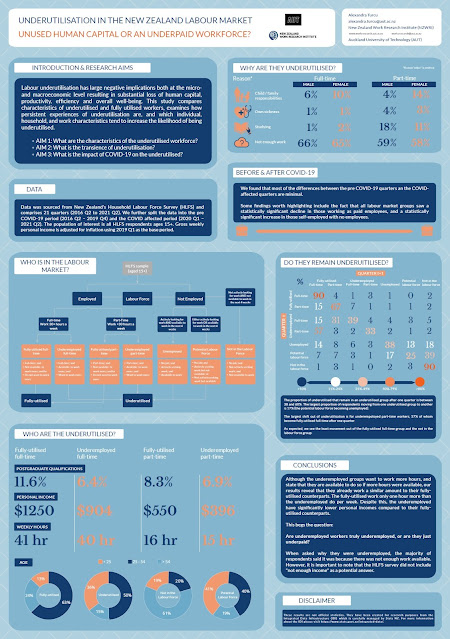The New Zealand Association of Economists runs a poster competition at each annual conference - a good idea, encouraging concision and clear messaging, not always a forte of economists - and this year it was deservedly won by Alexandra Turcu of AUT's Work Research Institute, with her entry, "Underutilisation in the New Zealand labour force: Unused human capital, or an underpaid workforce?". The winner's decided by popular vote of the attendees, and I voted for it, too.
Before reading it, and (I'd guess) like everyone else, I'd always assumed that the "underemployed" were available to work more hours than they currently are, and were a reserve slush fund of unused labour availability. But Alexandra discovered something striking about the apparently "underemployed".
She looked at the characteristics of two kinds of underemployed people - the full-time underemployed (full-time; available to work more; want to work more) and the part-time underemployed (part-time; ditto; ditto). Remarkably, she found that "Although the underemployed groups want to work more hours, and state that they are available to do so if more hours were available, our results reveal that they already work a similar amount to their fully utilised counterparts. The fully-utilised work only one hour more than the underemployed do per week": full-time employees, for example, who said they were "underemployed" were actually working 40 hours a week, virtually the same as the 41 hours of fully employed full timers, and it was the same story with part-timers where the "underemployed" ones were putting in 15 hours a week compared to the 16 put in by fully utilised part-timers.
So it is not at all obvious that these people actually form any substantial pool of increased labour supply - an important thing to know if, for example, you're the Reserve Bank wondering about potential output and full employment - and it's likely that what they're telling Stats has less to do with their availability to put in more hours and rather more to do with their relatively low incomes. As Alexandra put it, "This begs the question: Are underemployed workers truly underemployed, or are they just underpaid? When asked why they were underemployed, the majority of respondents said it was because there was not enough work available. However, it is important to note that the HLFS [household labour force survey] survey did not include "not enough income" as a potential answer".
So one practical lesson to take away is that there is less slack in the labour supply than you might have thought, if you had been relying on those apparently "underemployed" being available to step up to the plate and do more work. And if you were concerned about their low incomes, there's a positive to take away: fully 57% of those "underemployed" part timers transitioned into fully utilised full timers in the following quarter. They don't sit on the sidelines for long.
Here's the full poster.
